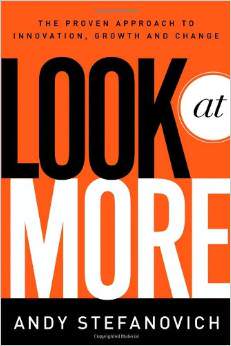innovation = f(mood, mindset, mechanisms, measurement, momentum)
It seems to be an accepted fact these days that big companies normally innovate by buying a startup with innovative products, rather than focusing on in-house innovations. This is a good thing for entrepreneurs and investors, who can win big, but it’s not a given. I see many startups who seem satisfied with a “me too” approach, building yet another social network or e-commerce site, rather than being truly innovative.
Much has been published on this subject, including a new book “Look at More: A Proven Approach to Innovation, Growth, and Change” by Andy Stefanovich, which is really a guide to established companies for unleashing creativity within their organizations. He asserts that the problem is lack of inspiration, and he supports this with twenty years of real case studies from his own experience.
The good news is that most entrepreneurs and startups have more inspiration than almost anything else, and it sometimes leads to success despite their lack of resources and business skills. Yet even entrepreneurs need to focus on the most effective way to unleash innovation and maximize their chances for success.
Andy offers a simple mantra for innovation, expressed as “Look at more stuff; think about it harder.” This mantra is complemented by a framework known as the five M’s, which are five key principles for unleashing creativity in any environment:
- Mood. Inspiration and creativity require the right context of attitudes, feelings, and emotions. Every business leader who wants innovation must constantly monitor and set the proper mood for the environment. You can set the right mood by purposefully disrupting the status quo, initiating change, asking provocative questions, and listening.
- Mindset. This is the intellectual foundation of creativity, the baseline capacity each of us has for getting inspired, staying inspired, and thinking differently. Four thinking disciplines which produce a creative, inspired mindset include changing your perspective, taking risks, finding your passion, and challenging assumptions to embrace ambiguity.
- Mechanisms. These are the tools and processes of creativity that help you engineer inspiration into the way you work and empower your organization to embrace the kind of behavior that fosters innovation. Four key steps include building a context, generating ideas, filtering ideas, and building a blueprint for implementing the best ideas.
- Measurement. Even creativity needs guidance and critical feedback on the qualitative and quantitative performance of individuals and organizations. Measurements send a strong signal of what is important and where people should focus their passion and energy. In addition to measuring results, you need to measure mood, mindset, and the mechanisms above.
- Momentum. This is accomplished by the active championing and celebrating of inspiration and creativity that foster a self-reinforcing cycle for increasing innovation. Momentum is an organizational priority for inspired leaders who have a clear understanding of the other four M’s.
Not everyone has to be a leader for innovation to work. Research has indicated that followers are just as important to consider as leaders when thinking about creating the mood and momentum for creativity, inspiration, and innovation. Likewise, the right mindset alone isn’t enough. You have to be able to convince others and sell your ideas.
Thus, even entrepreneurs must not assume that their efforts and their team will be creative and innovative. “Me too” startups don’t get funded, and they certainly don’t get bought for a premium by the sleeping giants who are looking for outside innovation to kick-start their growth again. Thus I suggest that every entrepreneur and every startup review their own environments for the five M’s, to avoid getting tagged as a “has been” before they even “have been.”

